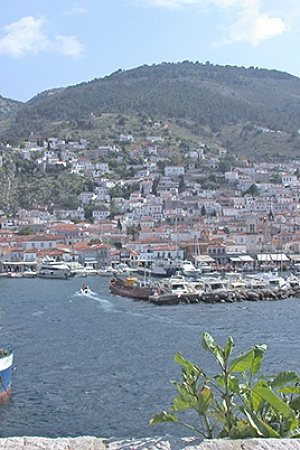'Nature’s ancient history'
It is easy to overlook that nature itself has a history – or at least our thinking about it does. In the years since Henry Thoreau initiated the modern genre of return-to-nature literature in Walden (1854), his autobiographical account of a two-year stint in the woods, the view that the natural world is a sphere apart – a realm untouched by human intervention – has lost nothing of its enticing allure. It is grounded in the assumption that nature is a dimension of the world not just separate from human civilisation but also one outside of time, and outside of human history and its numerous volatilities, dislocations, and tectonic shifts. And yet there is ample evidence to suggest that the natural world exists as much within the human imagination as outside of it; that it is just as much a real space as an imagined one. As Simon Schama and others have shown, ideas of nature and the natural are deeply entangled in our human ways of sense-making. They have a history of their own.
To those interested in untangling a few strands of this history, the Histories of the ancient Greek historian Herodotus are a good place to start. Herodotus’s fame rests on the fact that he authored the first extensive work of human history in the Western tradition. His main subject is the Greco-Persian Wars of the fifth century bce and the human customs and cultures of the peoples that came under Persian influence. Yet in addition to history and culture – the main themes of his book – he also comments frequently on nature. Herodotus embeds the past and present in a storyline that includes the natural world. In the Histories, nature serves as both a setting of human history and as an agent in time, with a logic and order of its own.
By including the natural world in an account of human history and culture, the Histories raise an issue that has gained new urgency in light of a recent environmental concern: man’s relationship to the natural world. Is human history a tale of man’s gradual separation from and mastery of nature, a tale according to which humanity evolves ever farther away from the natural world? Or is there a different story to be told, according to which nature and culture relate to each other in different ways?
The Histories challenge our assumptions about humanity’s ties to the natural world. They show that some views that strike us as modern might have a long history; at the same time, some perceptions of nature have remained remarkably constant over time. Certain ancient views prevail millennia later – it’s just that these days they come wrapped in decisively modern clothing.
It may, for example, be tempting to see the effects of human exploitation of the environment as symptoms of the malaise of modernity – and they certainly are to the extent and rapidity with which they threaten to destroy our planet. And yet already in the Histories, instances of the fundamental and even catastrophic effects of humans on nature are not hard to find.
At several points, Herodotus claims that the Persian contingents marching towards Greece were so huge that they fully depleted several rivers. The Persians and their human and non-human companions – horses, camels, mules – quite literally drank them dry, or so Herodotus has us believe when he asks rhetorically about the Persian King Xerxes: ‘Was there a nation in Asia that he did not take with him against Greece? Save for the great rivers, was there a stream his army drank from that was not drunk dry?’ No matter what we make of this curious claim, Herodotus chose an example from the natural world to illustrate the overwhelming size of the Persian army. Already in antiquity the environment served as a space to visualise destructive human forces. Even if the human footprint on the environment, in this case, is transitory – presumably the rivers will start flowing again once the troops have moved on – the image of humans exhausting natural resources sticks: Long before the Industrial Revolution and the corresponding changes in the nexus between humanity and the natural world, there was an awareness that human intervention could significantly alter the environment.
 Xerxes decorating a plane tree (Herodotus, Histories, VII, 31), Andrea Sacchi (1599–1661) © The Samuel Courtauld Trust, The Courtauld Gallery, London.
Xerxes decorating a plane tree (Herodotus, Histories, VII, 31), Andrea Sacchi (1599–1661) © The Samuel Courtauld Trust, The Courtauld Gallery, London.
Elsewhere, Herodotus tells of large-scale engineering feats that leave lasting traces in the physical environment. The Greek city of Cnidus, for example, when faced with the prospect of being overrun by that same river-depleting army, decided to turn their peninsula into an island. The plan was to dig through the narrow land bridge that attached their isthmus to the mainland. In the Histories, such drastic intervention into nature is not a singular occurrence: the Lydians at one point diverted the Halys River in order to allow their army to advance more quickly. We could significantly extend the list of examples here, but one thing has already become clear: already in the ancient world humans sought to alter the course of history by altering the course of nature.
How does Herodotus frame such incidents? As the classical scholar Katherine Clarke has recently pointed out, the Histories present such examples of spectacular human intervention into the natural world with some ambivalence. At times, Herodotus expresses a sense of awe at what is humanly possible; at others, he treads more cautiously by describing the negative consequences of human intervention. The above-mentioned citizens of Cnidus, for example, learn their lesson the hard way: while digging through their isthmus, they are affected by strange eye afflictions serious enough to warrant consulting the oracle of Delphi, which was quick to respond: ‘Do not fence off the isthmus; do not dig. Zeus would have made an island, had he willed it.’ The moral here is clear: not everything that is humanly possible is also prudent and advisable. There are set limits to human action.
And yet to say that Herodotus depicts humans as an invariably destructive force would be to oversimplify. Instances of human care, if not of nature as such, at least of certain parts of it, are also attested. There is the endearing case of King Xerxes delighting in a beautiful plane tree on his march toward Greece: ‘This was the road which Xerxes took, and it was hereabouts that he came across a plane-tree of such beauty that he has moved to decorate it with golden ornaments and to appoint a guardian for it in perpetuity.’ Elsewhere in the Histories, Xerxes features as a ruthless and cruel king who does whatever it takes to prevail, but here he has not only an eye for the physical beauty of a single tree but also safeguards its future by creating what is perhaps the first conservation job in historical record.
Overall, then, and despite all cases of spectacular human intervention, Herodotus does not depict a fundamental gap between humanity and the natural world. Rather, he variously points to the symbiotic relationship between the two. He tells us of the various ways in which people in different parts of the ancient world carve out a living from the natural resources available to them. About the ancient Egyptians, Herodotus states: ‘Not only is the Egyptian climate peculiar to that country, and the Nile different in its behaviour from other rivers elsewhere, but the Egyptians themselves in their manners and customs seem to have reversed the ordinary practices of mankind.’ Here and elsewhere, nature and culture map perfectly onto each other. Nature reflects culture and vice versa; together they account for local peculiarities.
Occasionally at least, such correspondences go beyond the merely accidental to imply relationships of cause and effect. The view that nature shapes culture is directly articulated by one of Herodotus’s historical characters. Facing the suggestion that the Persians, thanks to their military successes, would be able to abandon their barren homeland and settle in more fertile neighbouring lands, the Persian king Cyrus disagrees. He points out that ‘soft countries breed soft men’ followed by the explanation: ‘It is not the property of any one soil to produce fine fruits and good soldiers too.’ What Cyrus is saying here is that one cannot have both an empire based on military strength and an easy life of natural abundance. There is a direct link between the toughness of one’s lands and the toughness of one’s soldiers.
Although this sort of crude environmental determinism no longer has currency today, its repercussions still ring true millennia later: place, geography, and location – including the natural world – have once again entered the domain of the historian, at least since Fernand Braudel’s landmark study The Mediterranean and the Mediterranean World in the Age of Philip II (1949), in which he so expertly showed how nature, geography, and the environment shape history. We seem to have come full circle.
Where does this leave us with regard to the ways in which we conceptualise man’s relationship to nature and conceive of the relationship between nature and culture?
As far as the Histories are concerned, one view, in particular, has a surprisingly contemporary ring: that of nature as a balanced system. Herodotus presents the natural world as a realm in which different forces coexist and keep one another in check: ‘Divine providence, in the wisdom one would expect from it, has made prolific every kind of creature which is timid and preyed upon by others, in order to ensure its continuance, while savage and noxious species are comparatively unproductive.’ There is an intricate balance in nature which ensures that, over time, no species expands unchecked at a cost to the others. In the Histories, this process is still overseen by the divine, but the dynamic of cause and effect is entirely natural: it plays out in the balance between a species’ rate of reproduction on one hand and the number of its natural enemies on the other.
To illustrate this point, Herodotus draws on the example of timid hares and fierce lions: while the former have numerous offspring and can carry foetuses at different stages of gestation at the same time, the latter breed only once in a lifetime, because, as Herodotus claims, towards the end of the pregnancy, the cub’s sharp claws destroys its mother’s womb. Even if today we may find the specifics of how this balance is achieved fanciful, it is astonishing to encounter such views as early as the fifth century bce – more than 2,500 years ago.
In the modern era, the idea of a balance in nature has been linked to the view that human intervention can upset the equilibrium. To conceive of nature and culture/ society as separate and opposing realms makes it possible to think of one as prior to the other. And yet scholars working in the emerging field of environmental humanities have recently advocated for a change in perspective. We are challenged to see nature and culture no longer as opposing and separate spheres of life with the capacity of one to dominate the other; rather, in the face of the unprecedented natural destruction caused by humanity, we have been called upon to write humans back into the history of the natural world.
Herodotus anticipated this move. In the Histories, humans are not outside of nature but an intricate part of the larger processes and patterns that balance things out. This does not concern just the many small examples in the Histories, in which human excesses of all sorts are followed by retributive backlashes – administered divinely or humanly (or both). This also affects the overall explanation that Herodotus offers for how the much smaller Greek contingents triumphed over the vast Persian army in the Greco-Persian Wars: here, too, Persian excess and overexpansion contributed to their unlikely defeat at the hands of the Greeks. In human history, as in the natural world, what goes up must come down.
In the end, it appears that part of the solution to the environmental crisis we are currently facing may well lie in the past and in an insight that was obvious already to Herodotus: a sustainable state between nature and culture, between humanity and the environment, can be reached only if and when we see ourselves as part of the natural world rather than as its masters, and if we respect the processes, cycles, and laws of nature of which we are part.
All translations are from Herodotus’s Histories, translated by Aubrey de Sélincourt, revised with introduction and notes by John Marincola (Penguin Classics, 2003)











Leave a comment
If you are an ABR subscriber, you will need to sign in to post a comment.
If you have forgotten your sign in details, or if you receive an error message when trying to submit your comment, please email your comment (and the name of the article to which it relates) to ABR Comments. We will review your comment and, subject to approval, we will post it under your name.
Please note that all comments must be approved by ABR and comply with our Terms & Conditions.